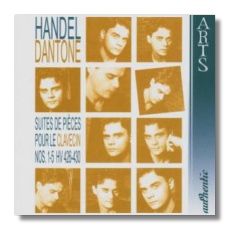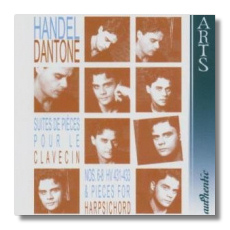
The Internet's Premier Classical Music Source
Related Links
- Handel Reviews
- Latest Reviews
- More Reviews
-
By Composer
-
Collections
DVD & Blu-ray
Books
Concert Reviews
Articles/Interviews
Software
Audio
Search Amazon
Recommended Links
Site News
 CD Review
CD Review
George Frideric Handel

Suites for Solo Keyboard
- Suite #1 in A Major, HWV 426 (11:09)
- Suite #2 in F Major, HWV 427 (9:43)
- Suite #3 in D minor, HWV 428 (22:53)
- Suite #4 in E minor, HWV 429 (16:15)
- Suite #5 in E Major, HWV 430 (14:01)
Ottavio Dantone, harpsichord
Recorded Villa Medici, Briosco, Italy, October 1998
Released December 2004
Arts Music 47698 74:01


- Suite #6 in F Sharp Major, HWV 431 (9:18)
- Suite #7 in G minor, HWV 432 (20:22)
- Suite #8 in F minor, HWV 433 (14:38)
- Chaconne in G Major, HWV 435 (6:55)
- Sonata in G minor, HWV 580 (2:36)
- Sonatina in G minor, HWV 583 (0:41)
- Air in G minor, HWV 467 (3:14)
- Capriccio in G minor, HWV 483 (1:33)
- Fuga in G Major, HWV 606 (3:34)
- Capriccio/Lesson in a minor, HWV 496 (1:57)
- Fuga in a minor, HWV 609 (5:24)
Ottavio Dantone, harpsichord
Recorded Villa Medici, October 1998
Released January 2005
Arts Music 47699 71:25
Comparisons: Cuckston/Naxos, Gavrilov/Richter/EMI, Gould/Sony, Jarrett/ECM, Newman/Sony, Nicholson/Hyperion, Ross/Erato, van Asperen/Sony, Verlet/Astrée, Yates/Chandos
Summary: "Handel From The Heart"
Handel's standing as one of the greatest composers of the high baroque period is based on his Messiah, dozens of other oratorios and operas, Water Music, and Music for the Royal Fireworks. His works for solo keyboard do not get prime exposure although recordings of these works are not infrequent. Are Handel's Suites for Keyboard lesser creations? Definitely not. His supreme gift for melody is readily apparent in his keyboard works, just on a smaller scale than found in his orchestral and vocal works. Be it poignant Sarabandes or super-charged Gigues, Handel's Suites are life-affirming and beautiful creations.
I should mention the organization of Handel's Suites for Keyboard. He composed twenty Suites, but only eight are generally grouped together. They are designated as HWV 426 thru 433 and are often referred to as the Eight Great Suites or the Eight Suites for Keyboard. These Eight Suites are the ones that Ottavio Dantone covers in his two discs.
Dantone is not a very familiar name to the general classical music audience, but his recordings of Bach's complete Well-Tempered Clavier for Arts Music have received much acclaim from Bach enthusiasts. My previous encounter with Dantone featured the outstanding cadenzas he wrote for the Viktoria Mullova disc of Mozart Violin Concertos.
Getting to the crux of the matter, Dantone gives us an outstanding performance of Handel's Suites for Keyboard. Before offering my reasons for having such a high opinion of Dantone, I'd like to relate where he does not match particular comparison versions. Dantone does not get into whatever profound elements exist in the music – that's not a priority for him. If you compare Dantone to Richter, it's Richter who finds the emotional depth. In the matter of creativity, Gould makes Dantone sound like "Mr. Mainstream". For a warm glow, Ross can't be beat. If you're looking for an incisive Handel, van Asperen cuts with a sharp knife; Dantone is neither sharp nor smooth. Are conversations among the music lines important to you? Then Verlet is the choice. Dantone is no slouch when exuberance is called for, but he can't reach the high spirits coming from Yates.
So what's so special about Dantone's interpretations if he doesn't stand out concerning emotional depth, exuberance, incisiveness, originality, warmth, and conversational properties? The 'big picture' answer is that when I think of Dantone's performances, I think of Handel and not any particular facet of his music. One reason is that Dantone offers a musical sweep and inevitability second to none; as he traverses the scores, every note/chord/phrase seems so natural and right. Another reason has to do with the bitter/sweet nature of Handel's Adagios and Sarabandes. These pieces don't deeply probe the human psyche, but they are gorgeous and poignant. Only with Dantone am I strongly aware of the bitter/sweet contrasts inherent in the music; miraculously, he invests single notes with these contrasts. Lastly, Dantone gives us a Handel who is satisfied with life and fully understands its most important rewards. This is a joy that is lasting, not of the moment as represented in the performances of Sophie Yates.
Continuing with alternatives, a decent one is the Cuckston harpsichord set on the super-budget Naxos label. He certainly offers the flavor of these works, although the gravity of the slower movements sometimes escapes him as well as the propulsion of the fast movements. Dantone is significantly more rewarding, and Arts discs cost only slightly more than Naxos; Dantone is also given much better sonics than Cuckston.
Gavrilov and Richter each play four of the Eight Suites on a 2CD set. Gavrilov is no slouch in this music, but my impression is of a pianist interpreting the compositions. With Richter, a transcendent level is reached where the choice of instrument never enters one's mind. Richter is essential in this repertoire, probing the emotional core at every turn. Those who assume that Handel's core isn't very deep will instantly change their minds with Richter at the helm.
For a rather odd alternative, we have Glenn Gould playing four of the Eight Suites on a harpsichord. Guess what? He plays them just as he would on the piano. Regardless, his interpretations are always interesting. Gould's penchant for ceremony, precision, and propulsion are in full display, and his Prelude from Suite #1 is amazing for its improvisatory and busy character replete with a Latin American flavor. This Sony disc is filled out with 2 sets of Preludes/Fugues from Bach's Well-Tempered Clavier. Not an essential acquisition, but certainly an 'original'.
Keith Jarrett's Bach recordings favor beauty and seamless flow at the expense of intensity/bite, and he gives Handel the same treatment. Extremely user-friendly, Jarrett can remind me of an excellent lounge player at a local hotel. Still, it's a good disc for romantic interludes and worth some attention. Jarrett plays four of the Eight Suites along with three additional Suites.
Anthony Newman plays the Eight Suites on an unattractive sounding harpsichord. Further, he tends to chop his way through the music, displaying an hostility for a true legato. On the other hand, his readings are highly propulsive, and he manages to fit the Suites on one disc through very quick tempos and the skipping of some repeats. I'm afraid these performances and the sonics are not competitive with most alternative recordings. Dantone leaves Newman in the dust.
There's definitely no dust on Paul Nicholson's Hyperion Dyad set of the Eight Suites. This is superb harpsichord playing in exceptional sound. The set has everything: poignant Sarabandes, uplifting Allemandes, exciting Fugues/Gigues, and it's all enveloped in a thoroughly stylish manner that I can't imagine anyone not appreciating. The set also includes Handel's 6 Fugues/Voluntaries for Organ (played on harpsichord) and two additional Fugues. The Dyad reduced price is one more reason to add this essential set to your Handel collection.
The fame of Scott Ross is largely based on his colossal undertaking of recording all 555 keyboard sonatas of Domenico Scarlatti, but he was also a superlative performer of Handel's music. Ross' set of the Eight Suites has been my favorite for many years. From my perspective, it gives me everything Nicholson has to offer with the added benefit of a warmth and sensuality not found in any other recording. Ross offers relatively full textures and perfect balance of voices, qualities that make the Allemandes wondrous affairs. At the same time, detail is not neglected and there's plenty of punch from Ross when needed. The 1984 sound has held up nicely, but not the availability of the set. Currently out-of-print, it will hopefully be released by Warner at some point as was recently done with Ross' recording of Bach's Partitas. In the meantime, do search your used sources; you won't regret it.
Another exceptional recording comes from Bob van Asperen. This one only has three of the Eight Suites along with the well-known Chaconne in G Major, Passacaglia in G minor, and an additional Suite. van Asperen's textures are leaner than Ross', and his phrasing is more sharply etched as well. Unfortunately, this Sony Vivarte release is also out-of-print, and I have doubts that Sony will be reissuing it.
More riches are offered by the superb harpsichordist Blandine Verlet on her 2CD set of the Eight Suites. Most impressive is the rhetorical nature of her interpretations that also possess a fine intimacy and contemplation. Her upper voice notes ring out with authority and are set against a well balanced and projected bass underpinning. Best of all, Verlet changes the music's textures in the repeats instead of getting caught up in a series of trill-like embellishments as is the practice with most keyboard artists. With a wonderful soundstage of depth and crispness, this set is among the best on record. U.S. Availability is spotty, but the European markets continue to embrace the discs.
Sophie Yates has put down three volumes of Handel's keyboard music and still hasn't recorded all of the Eight Suites; Suite #7 is the no-show, and this strange programming isn't exactly user-friendly or economical for those wanting to obtain the Eight Suites. Of course, superb performances would easily overcome this problem, but Yates doesn't quite reach this level. I must say that she's fantastic in the faster movements such as the Courantes, Gigues, and Allegros; her propulsion, exuberance, and toe-tapping rhythmic flair have no peers. However, she does not dig as deeply into the Allemandes and Sarabandes as in the best recorded versions. Most damaging is the very bright soundstage that is much less flattering than the sonics offered by some of the other comparison versions.
Two matters remain. One concerns a 2003 set of the Eight Suites played by the early keyboard specialist Ludger Remy on the CPO label. I do not own this set, but everything I've heard from Remy is exceptional. His Handel is probably also wonderful, so acquiring the set would likely be a good decision; I will be buying it with a review to follow.
The second matter is the eight short works that Dantone plays to fill out the second disc. I want to emphasize that these pieces are much better than 'filler' material. Among the highlights is the well-known Chaconne in G Major where Handel manages to cover 21 variations in under 7 minutes. Handel's penchant for wonderfully lyrical melancholy is represented by his Sonata in G minor and Air in G minor. For a strong dose of chromatic music, look no further than the compelling Sonatina in G minor. Dantone concludes his program with the best of the eight pieces, the emotionally rich and rather bleak Fuga in a minor.
Don's Conclusions: If you love Handel's keyboard music, you have to own the Dantone recordings. The same applies to Richter, van Asperen, Verlet, Nicholson, and Ross. And now I'll take my leave so that you can swing into action and acquire these exceptional discs of brilliant keyboard music.
Copyright © 2005/2006, Don Satz




















